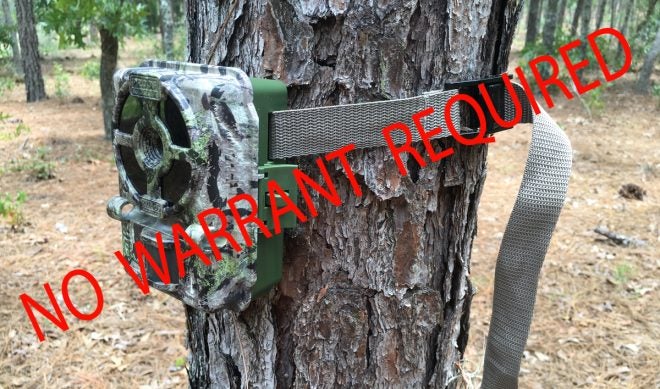Open Fields: Government Cameras Hidden on Private Property Without Cause or Warrant
Russ Chastain 08.14.20

(Photo © Russ Chastain)
Most Americans believe a warrant is needed before government agents can enter private property to search and snoop — and place cameras in order to monitor the activities of the land owners — but sadly, an odd concept known as “Open Fields” has been adopted by our government to excuse warrantless surveillance, even on owners’ home properties.
It’s unsettling. It’s also been going on for a long time.
I learned about it recently via an article at AgWeb Farm Journal, which opens by telling readers how ten well-armed federal and state wildlife officials surrounded Hunter Hollingsworth’s home one morning “with all kind of guns, extra [magazines], first aid kits, and bulletproof vests” and pounded on his door, stating, “Open up or we’ll kick the door down.”
All because seven months earlier he’d discovered an unmarked game camera on his own posted private property, and had (naturally) removed it. The camera had been monitoring him on his own private property, sending images via cell signal for at least two months prior to its discovery. It belonged to the TWRA (Tennessee Wildlife Resources Agency), though it was not marked as such.
The camera had been placed by government officials who had entered his private land without probable cause nor a warrant. It apparently happens all the time — and it’s excused by courts because they’ve translated our Fourth Amendment rights as only applying to “home, personal effects, and the curtilage.” Curtilage generally means the area immediately surrounding your home. Anything beyond that is unprotected by the courts which wield the authority to mangle the Constitution of the USA.
The article also discusses Terry Rainwaters, who owns land about 5 miles from Hollingsworth and had discovered numerous cameras on his land, and has even encountered wildlife officers sneaking and lurking on his property.
“Rainwaters contends he has encountered armed TWRA agents on his private property on multiple occasions, either crossing his land or hiding in undergrowth during hunting season. Rainwaters explains: ‘TWRA officers sneak onto my land with no cause other than hoping to find somebody doing something wrong. I’ve got a clean hunting record and don’t look for trouble with nobody, but people just can’t believe what has happened on my land. It’s so wrong on so many levels and way past outrageous and dangerous. I don’t think people realize a “no trespassing” sign or “private land” sign mean nothing to the TWRA.'”
These incidents raise numerous concerns for citizens:
- Who has access to these images of private citizens going about their business on their own property?
- How many government cameras are secretly placed on how many private parcels to surveil the owners?
- Can they in fact prosecute someone for removing or damaging a camera discovered on his or her own property?
- In what way is this okay in a “free country?”
As stated, such things are generally excused by our legal system and explained away by the “Open Fields Doctrine,” which is (or was originally) mainly applied to farm/agricultural land:
“A great deal of farming and ranching activities occurs in the “open” and the courts have held that, under the “open fields doctrine,” that government officials can make warrantless searches of such areas.”
What can we do about this? Apparently, not much. But the Institute for Justice is using both of the above cases to hopefully secure a bit more privacy for Tennessee residents under their state constitution by barring TWRA — a state agency — from violating its guarantee of privacy.
“I want to reiterate the significance of what is happening to Tennesseans on their private land,” Windham concludes. “This is about so much more than hunting or cameras. This is about the basic right of every Tennessean for privacy on their own property. Terry and Hunter are standing up for that right. They want the surveillance to end—on their land and everywhere else.”
As for Rainwaters and Hollingsworth, the pair is in agreement: The marriage of privacy and property rights is currently neglected by SCOTUS, but state constitutions must protect the union.
Here’s hoping.